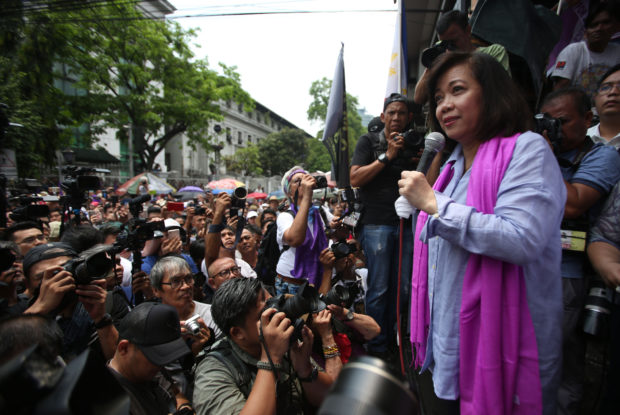‘Til kingdom come no more: Sereno no longer chief justice
As they say, #WalangForever.
When now-ousted Supreme Court (SC) Chief Justice Maria Lourdes Sereno assumed office on August 24, 2012, it seemed safe to say that the internet did its job bringing light moments to serious issues.
At 52 years old, Sereno was the youngest appointed top magistrate of the country, and was poised to take the helm of the high tribunal until 2030 – a staggering 18-year term that would have spanned across four different presidential tenures, a minimum of seven elections, and a lifetime of paperwork to deal with.
On microblogging site Twitter, netizens quickly poked fun at the vast possibilities that could happen before Sereno steps down from office.
From audacious claims like the Philippines being a first-world country, former President Benigno S. Aquino III having a wife, up to the second coming of Jesus Christ, they were all made with the hashtag #CJPaSiSereno.
Other witty tweets included:
“Robot na si GMA, #CJPaSiSereno” – @tweetnirizal
“Kalbo na si P-Noy, #CJPaSiSereno” – @FerdieTopacio
“Umamin na si Tito Sotto na guilty sya ng plagiarism, #CJPaSiSereno” – @doncallmethat
Almost six years down the line, the Philippines is still a third-world country, Aquino is still a bachelor, and no one still knows if ever there was indeed a second coming for Jesus Christ, but Sereno is no longer the Chief Justice of the Philippines.
The SC voted 8-6, granting the quo warranto petition that sought to remove Sereno from office. The quo warranto petition was filed by Solicitor General Jose Calida – the principal lawyer of the government – who questioned the qualification of Sereno as the country’s top magistrate.

Chief Justice Ma. Lourdes Sereno meets her supporters along Taft Avenue in Manila after the Supreme court voted 8-6 , granting the quo warranto petition filed by Sol Gen Jose Calida.
INQUIRER PHOTO/JOAN BONDOC
Who is CJ Sereno?
Aside from being the youngest chief justice, Sereno was the first woman to head the judiciary. She was born to a humble family, raised by a Sulu native father and public school teacher. She graduated with honors from the Kamuning Elementary School and Quezon City High School.
Sereno then earned an Economics degree at Ateneo de Manila University, and a Bachelor of Laws degree at University of the Philippines, graduating valedictorian in 1984.
According to the Judicial and Bar Council, after working with a law firm in the Philippines, Sereno joined the UP College of Laws where she was a professor for almost 20 years.
Sereno was also awarded in 1992 a De Witte Fellowship and a Ford-Rockefeller Scholarship, enabling her to pursue her Masters of laws at the University of Michigan.
She was chosen as a member of the 1999 Preparatory Commission on Constitutional Reform where she was the Chairperson of the Commission’s Steering Committee. In the same year, together with Justice Jose Campos, Commissioner Haydee Yorac, and UP College of Law professors, she co-founded Accesslaw, the first electronic research system in Philippine law. /muf /kga